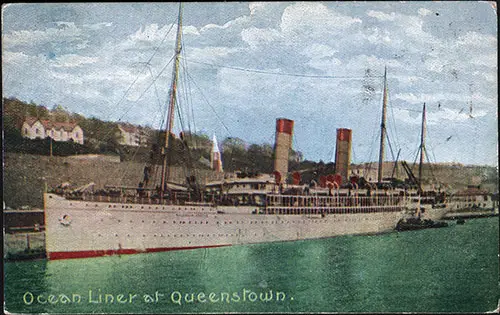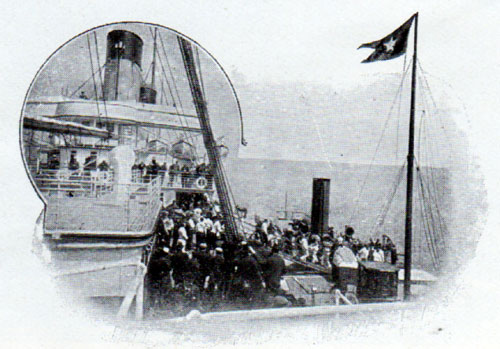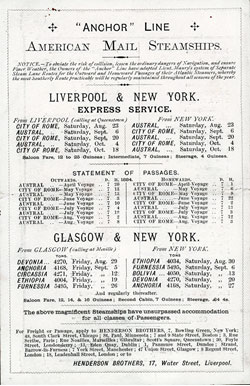Port of Cobh, Ireland

Ocean Liner at Queenstown circa 1905. GGA Image ID # 144594521a
For American travelers making their first visit to the British Islands and wishful to see some of the beauties of the Emerald Isle, a good plan is to land at Queenstown and proceed through Glengariff to the far-famed Lakes of Killarney.
Abandoning Queenstown (1913)
The White Star liner Olympic sailed from Queenstown on Sept. 25 without taking 200 passengers and 1,500 sacks of mail waiting to be shipped to New York on board. Of course, the passengers immediately held an indignation meeting and were loud in their denunciation of the treatment meted out to them, and telegrams full of fire were sent to the White Star company.
Now, if these passengers would stop and think for a moment, the last thing the White Star Line or any other steamship company would do would be to discommode its passengers, especially such a distinguished lot of passengers waiting at Queenstown.
The harbor of Queenstown is no safe place for the giant liners that have been created during the past few years, and it would be a mighty foolish undertaking for the steamship company to risk so valuable a piece of property as the Olympic in such a dangerous waterway.
The company did all that it could on the premises. The Olympic anchored in the roadstead outside the harbor, but the tender masters considered the heavy swell too dangerous to attempt to take the passengers to the smoother water inside Roches Point.
The RMS Olympic captain declined to follow them aboard the steamer and turned around and made for the harbor. He waited outside until the tenders had returned to Queenstown and disembarked their passengers.
The White Star Line did only what was prudent in its actions, and the passengers suffered no material delay as the Adriatic was sent for them the next day.
In this policy, the White Star Line is simply following the lead of the Cunard Steamship Co., which has definitely abandoned Queenstown as a port of call for its express steamers Lusitania and Mauretania, notwithstanding the fact that it had a contract with the British postal service to call there regularly for mail.
The matter was thoroughly investigated by the Board of Trade and the nautical adviser of the post office department. It was the conclusion that it was hazardous, even in fine weather, for these steamers to proceed into the harbor at any time near low water. It was almost impossible to select a spot where they could swing clear of shallow water at a single anchor.
The gravity of the situation would be significantly enhanced in heavy weather. The circumstances that caused the Cunard Co. to realize that they were taking an unwarrantable risk occurred to the Mauretania last spring when she entered Queenstown harbor about one and one-half hours after high tide, that is, on the ebb. She anchored with her bow pointing up the harbor.
The gale's violence overcame the tide's influence, and she swung athwartship of the harbor with her stern, very close to the shoals. In this position, she was practically fixed and could not use her screws to turn around to proceed to sea but had to wait for the flood tide to swing her.
Therefore, It is no wonder that the Cunard Co. has abandoned Queenstown, and the wisdom of the White Star Line in declining to send the RMS Olympic into the harbor during heavy weather cannot be disputed.
Ports of Call - Queenstown (Cobh) - 1911
Arrangements for Ocean Passengers landing at Queenstown.
Travellers landing at Queenstown will do well to consult the Great Western Railway Company's representative, who meets all Liners and will be pleased to provide full particulars relative to the various tours in Southern Ireland and all places of interest on the Great Western system of Railways.
Convenient tours can be made to the world-renowned Lakes of Killarney, the coach routes of the extreme west, the Vale of Ovoca, made famous by the poet Moore, and many such places unique to Ireland. On completing their round of sight-seeing Passengers can travel directly from any of these districts to England by the through Trains to Rosslare Harbour, from whence the Great Western Railway's magnificent Turbine Steamers run to Fishguard Harbour, performing the journey in 2 3/4 hours. Specially built vestibuled Restaurant Car (and at night Sleeping Car) Trains run direct to London, via Cardiff, with connections to all parts.
Advantages of the Liverpool-Queenstown Route (1907)
Liverpool is the most central point of landing or embarkation in the British Islands.
It is situated about midway between London in the South and Edinburgh and Glasgow in the North, at a distance of 190 to 220 miles, and services of luxuriously appointed express trains maintain communication with each of these important cities.
London is less than four hours distant. York and other historical cities in the North of England are within easy reach, and the venerable and most interesting town of Chester, with its ancient Cathedral, encircling walls, and numerous Roman antiquities, is only sixteen miles away.
The ancient towns of Shrewsbury, Warwick, Stratford-on-Avon, and Windsor lie on the routes from Liverpool to London, as do Chatsworth, Haddon Hall, Newstead Abbey, Southwell Minster, Bedford (with the memorials of Bunyan), and St. Albans.
Queenstown

Landing the Mails at Queenstown circa 1907. GGA Image ID # 1445b2febc
For American travelers making their first visit to the British Islands and wishful to see some of the beauties of the Emerald Isle, a good plan is to land at Queenstown and proceed through Glengariff to the far-famed Lakes of Killarney, thence through Dublin or Belfast to Liverpool.
The railway companies' enterprise has provided a series of new, high-class hotels at various points of interest in the southwest of Ireland, adding greatly to the attractions of that beautiful district.
Sailing Schedules that Include the Port of Cobh

Anchor Steamship Line Sailing Schedule, 23 August 1884 to 18 October 1884
Steamers and Ocean Liners operated by Anchor Steamship Line, were scheduled for transatlantic voyages between 23 August 1884 to 18 October 1884.

Anchor Steamship Line Sailing Schedule, 19 July 1890 to 29 November 1890
Steamers and Ocean Liners operated by Anchor Steamship Line, were scheduled for transatlantic voyages between 19 July 1890 to 29 November 1890.
Bibliography
"Abandoning Queenstown," in The Marine Review, Vol. 43, No. 10, October 1913, p. 371.
"Advantages of the Liverpool-Queenstown Route," in White Star Line Royal & United States Mail Steamers, 1907 Brochure.
